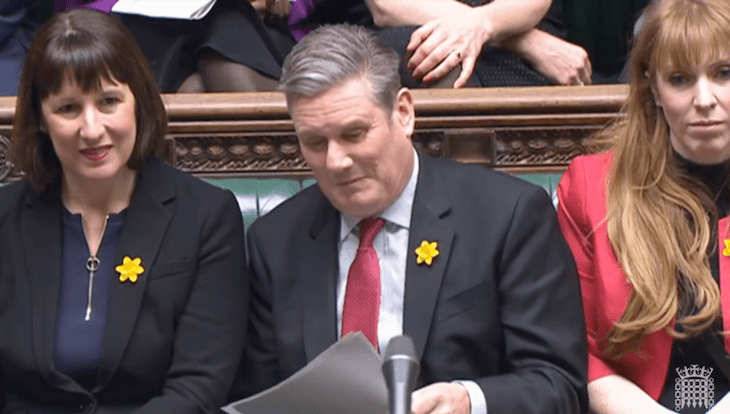Rishi Sunak bowled up to Prime Minister’s Questions in an excellent mood, clearly still on a high from his Windsor Framework. The PM was greeted by a huge cheer from Tory backbenchers on arrival, but then had six eclectic and not-particularly-effective questions from Keir Starmer to wade through.
The most important of those questions came at the end when the Labour leader asked about the Daily Telegraph story on Matt Hancock and care home testing. ‘We don’t know the truth of what happened yet’ because there were ‘too many messages’, Starmer said, before adding:
‘For families across the country will look at this, at the sight of politicians writing books, portraying themselves as heroes or selectively leaking messages, it will be an insulting and ghoulish spectacle for them.’
Starmer then complained that the Covid Inquiry has already cost the taxpayer £85 million and hasn’t heard from a single minister. ‘Can the Prime Minister assure the House: no more delays? That the Inquiry will have whatever support it needs to report by the end of this year,’ he asked the PM.
Starmer took an eclectic approach to his questions
Sunak looked relieved not to have to trawl through the messages individually. He said ‘the right way for these things to be looked at is the Covid Inquiry’ and that this independent probe ‘has the resources it needs, it has the powers it needs’ and that MPs needed to let it get on with its work. One of the reasons, as Fraser Nelson explains here, that the messages came out now was that the Inquiry does seem to be moving at a glacial pace. Sunak didn’t seem to be putting any pressure on it to speed up.
Starmer took an eclectic approach to his questions, running through living standards (and a weird joke about ‘young people learning to say Auf Wiedersehen, Pet, in Polish’ which had many in the Chamber cringing); energy bills and a windfall tax; backbenchers blocking housebuilding; and childcare. The Labour leader was clearly trying to contrast a lack of government achievements with the plans that his party has for getting things done, but it didn’t really light up the debate, or indeed enlighten anyone listening.
A number of other MPs chose to mock Sunak for his sudden conversion to the benefits of the single market. The SNP’s Stephen Flynn, who has a much more engaging approach to surgical questions than Starmer, managed to ridicule both main parties by asking the Prime Minister why, if EU single market access was ‘special, exciting and attractive’, he was ‘denying it to the rest of us’. He followed that up by asking: ‘Does it hurt the Prime Minister to know that the Labour party believe in Brexit more than he does?’
Others, including the SNP’s Joanna Cherry, pressed this point about the Prime Minister being a secret Remainer or refusing to allow Scotland a similar ‘unique’ position. Sunak’s answer was that it was all about avoiding a hard border, and that Flynn and others ‘knows better than that, he knows that this is about Northern Ireland’.
None of this joking will really hurt Sunak, but the question on the Covid Inquiry and the length of time it is going to take may well come back to haunt him. As chancellor, Sunak argued against a number of the more stringent measures during lockdown. Now that he is PM, it suits his party better for the Inquiry to drag on as long as Chilcot and other investigations, to the extent that, by the time it reports, it can cause very little political damage to the original protagonists, who will have largely fled the scene.







Comments